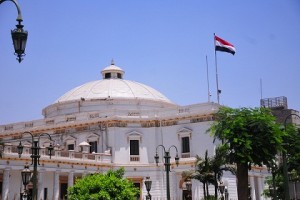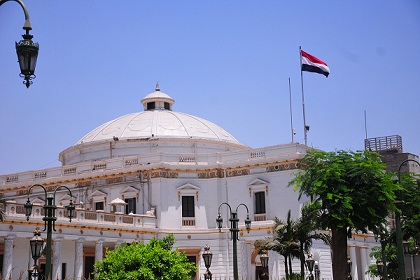
(DNE / FILE PHOTO / Hassan Ibrahim)
The committee tasked with amending the Political Participation Law and the Parliamentary Elections Law amended the draft legislations and referred them to the cabinet for approval on Wednesday.
Outgoing President Adly Mansour issued a presidential decree on 14 April creating the committee to amend the laws in preparation for the coming parliamentary elections. The committee is headed by Mohamed Amin El-Mahdy, minister of transitional justice and House of Representatives.
Criticised by several political parties, the draft was sent back to the committee for revision.
The new draft of the law decreases the numbers of seats in parliament from the previous draft. While the first said parliament would be made up of 600 seats and gave the president the right to appoint 30 more members, the new draft puts the elected members of parliament at 540, giving the president the right to appoint 5% of the members.
Of the 540 members, 420 will be elected individually, while the remaining 120 seats will be elected through electoral lists, as per Article 3 of the new draft.
Political parties criticised the earlier formation, having 480 members elected individually. Parties stated that electing the majority of the members individually would deprive the “underprivileged” of their chance of winning the elections, given the high costs of running for the elections individually.
The new version, as well as the older version, creates quotas for different minorities, to be applied during the coming parliamentary elections only.
The new draft divides the seats to be elected through electoral lists into four electoral districts. Two electoral districts are made up of 15 seats each, as per Article 5 of the new draft. Any list running for those districts should include: at least three Coptic candidates, at least two farmers and/or labourers, at least two youth candidates, at least one disabled candidate and at least one expatriate. The list should also include at least seven female candidates. It is possible for the women’s quota to overlap with the other quotas.
The other two electoral districts for electoral lists are made up 45 seats each. Any electoral list running for those districts should include: at least nine Coptic candidates, at least six farmers and/or labourers, at least six youth candidates, at least three disabled candidates and at least three expatriates. The list should also include at least 21 female candidates, where it is also possible for the women’s quota to overlap with the other quotas in those districts.
The 2014 Constitution includes transitional articles, articles 243 and 244, which oblige the state to “adequately” represent youth, Christians, disabled, Egyptian expatriates, farmers and labourers in the coming parliament in a manner to be organised by the law. The Constituent Assembly, which drafted the constitution, nevertheless cancelled the 50% parliamentary quota allocated to farmers and labourers since the era of late president Gamal Abdel Nasser in the 1960s.
Several political parties and movements condemned the “absolute electoral lists”, to be used in the coming parliamentary elections, as per both versions of the draft. This system allows only one list (of partisans, individuals or both) to win all the seats allocated to each of the four districts. During the 2011 parliamentary elections, the list seats were picked through “relative lists”, where members on each list were elected based on the percentage of votes each list received, therefore allowing representation of a larger variety of parties.
If approved by the cabinet, the draft would be sent to the president for ratification.
Officially announced as Egypt’s new president with 96.9% of valid votes on Tuesday, former defence minister Abdel Fattah Al-Sisi is scheduled to be sworn in on Sunday.


